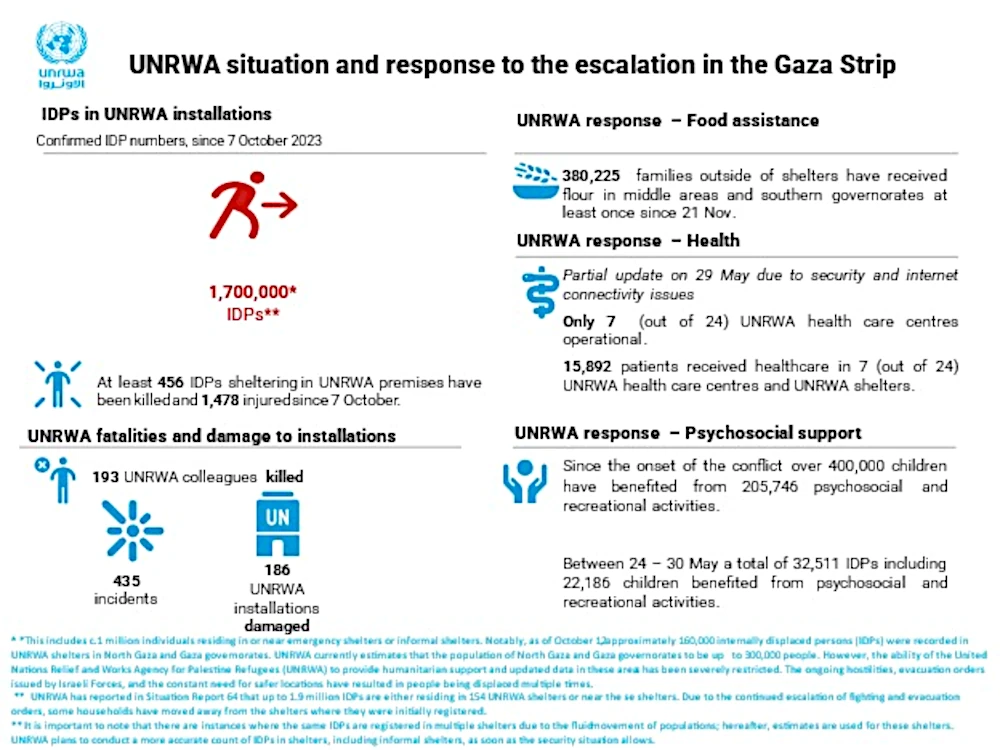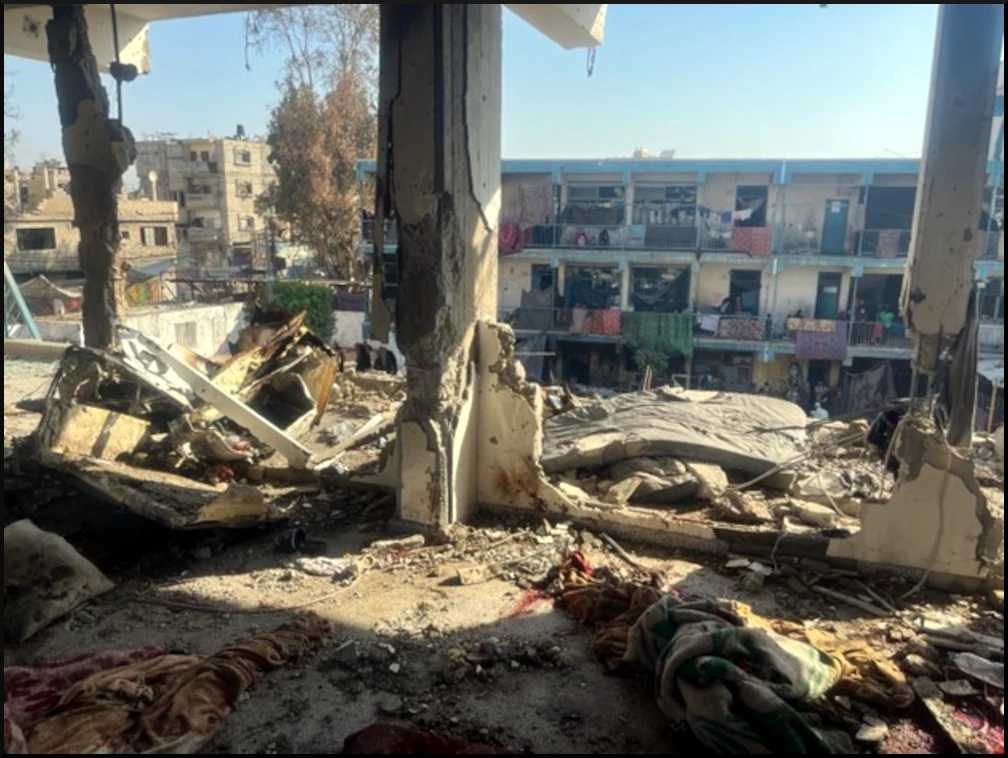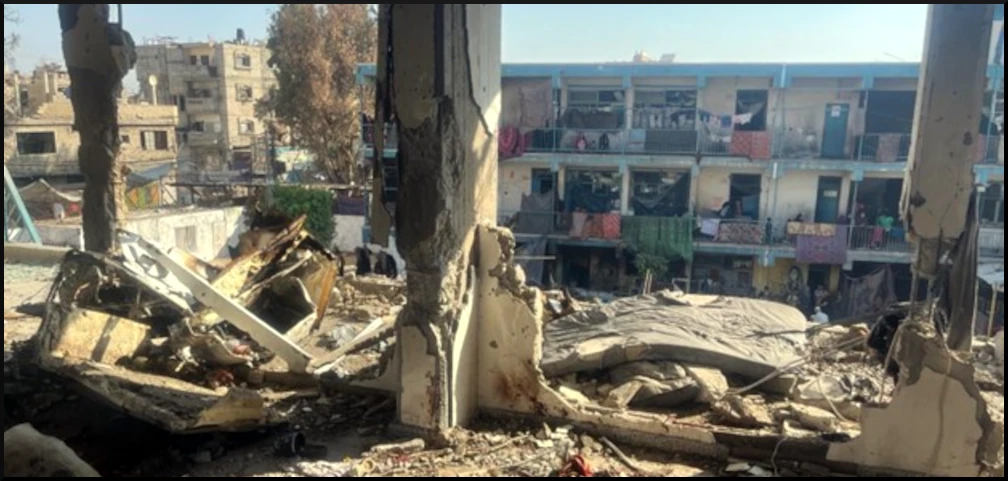UNRWA Situation Report no. 112 on the situation in the Gaza Strip
and the West Bank, including East Jerusalem
All information from 27 May-2 June 2024, is valid as of 2 June May 2024 at 22:30
Days 234-240 of Hostilities

Key Points:
The Gaza Strip:
- Ongoing strikes by Israeli Forces, with aerial, land and maritime bombardment across the Gaza Strip. These result in civilian casualties, displacement and the destruction of residential structures and civilian infrastructure. The Israeli Forces’ ground offensive continues to expand, particularly in the southern regions of Gaza City and eastern Rafah, notably around the Karem Abu Salem (Kerem Shalom) and Rafah Crossings.
- During the reporting period, aid operations in Gaza continued to be affected by disruptions to the telecommunications network, with internet service providers unable to carry out repair works. Connectivity remains sporadic and it is becoming increasingly difficult to communicate with humanitarian personnel on the ground.
- The total number of people displaced across the Gaza Strip is 1.7 million people; families already displaced several times are on the move again due to military operations and Israeli evacuation orders.
- As of 5 June 2024, almost all internally displaced people (IDPs) have left Rafah, with only around 100,000 who stayed in the area. All UNRWA shelters in Rafah have been vacated . Many of the people who were based in Rafah have fled up the coast seeking safer locations in both Khan Younis and the Middle Area.
- According to OCHA, access constraints persistently hinder the safe delivery of essential humanitarian aid across Gaza, worsening the situation for hundreds of thousands in need. Escalating hostilities in both northern and southern Gaza, especially in Rafah, have further degraded security and humanitarian access conditions in May. For the whole of May, of 348 coordinated humanitarian assistance missions to northern and southern Gaza, less than 50 per cent were facilitated by Israeli authorities, the remaining missions were either denied access, cancelled due to operational or security reasons or impeded. Many missions classified as “impeded” experienced extended delays imposed by the Israeli authorities at holding points, some lasting up to nine hours which significantly increase the security risks for humanitarian personnel.
- The current Israeli military operation in Rafah is directly impacting the ability of aid agencies to bring critical humanitarian supplies into Gaza as well as the ability to rotate critical humanitarian staff. UNRWA has maintained presence in Rafah with a focus on continuing missions to Kerem Shalom to retrieve fuel and aid commodities. On 5 June, UNRWA retrieved 62 trucks from Kerem Shalom (of which 57 were UNRWA). This is a sharp decrease in the number of UN and humanitarian trucks since the Rafah operation began. UNRWA is scaling up operations to significantly increase its capacity to retrieve aid via Kerem Shalom pending Israeli Authority movement approvals and cross UN support to manage logistics.
- Figures reflected from 6 May onwards are for humanitarian aid (UN/INGO) cargo only and exclude commercial activity. Due to the situation on the ground, updates may take some time to be fully reflected on the dashboard. For updates on trucks please check:Gaza Supplies and Dispatch Tracking | UNRWA
- As of 5 June, the total number of UNRWA colleagues killed since the beginning of hostilities is 193, an increase of one.

Overall Situation:
The Gaza Strip
- According to the Ministry of Health in Gaza as of 3 June, at least 36,479 Palestinians have been reportedly killed in the Gaza Strip since 7 October. Another 82,777 Palestinians have been reportedly injured.
The West Bank, including East Jerusalem
- According to OCHA, between 7 October 2023– 27 May 2024, 502 Palestinians, including at least 122 children, have been killed in the West Bank, including East Jerusalem.
The Gaza Strip
UNRWA is working to verify the details of incidents reportedly affecting UNRWA premises. Further information will be provided once it becomes available. Five incidents have been reported impacting UNRWA installations and IDPs sheltering there. While verification of details and casualty figures remain ongoing, initial reports indicate:
- On 2 June 2024, the Israeli Navy reportedly shelled the UNRWA Alternate Office Base / Residence in Rafah causing damage to the third floor of the building’s southern side. The full extent of the damage is yet to be confirmed. No injuries were reported.
- On 3 June 2024, an ISF drone reportedly fired several smoke bombs on UNRWA’s Logistics Base in Rafah causing damage, the full extent of which is yet to be confirmed. No injuries were reported.
- On 4 June 2024, ISF reportedly fired a missile towards the guards’ room at a school in Middle Area injuring two IDPs (a man and a child) sheltering at the school.
- On 4 June 2024, ISF reportedly shelled a health centre which is currently also being used as an emergency shelter in Middle Area, killing one child and injuring several IDPs.
- On 5 June 2024, an ISF tank reportedly shelled a health centre which is currently also being used as an emergency shelter in Middle Area, causing the building to sustain damage, the extent of which is at present unknown.
435* incidents impacting UNRWA premises and the people inside them have been reported since the beginning of the war (some with multiple incidents impacting the same location), including at least 72 incidents of military use and/or interference at UNRWA premises. 186 different UNRWA installations have been impacted.
UNRWA estimates that in total at least 456* internally displaced people (IDPs) sheltering in UNRWA shelters have been killed and at least a further 1,478* injured since the start of the war. UNRWA is still verifying the number of casualties caused by incidents that impacted its installations, and notes that these figures do not include some reported casualties where the number of injuries could not be determined.
*Numbers continue to be subject to change once further verifications have been conducted.
UNRWA Response:
The Gaza Strip
Health
- Over the last 10 days, UNRWA health centres have not received any medical supplies due to the Rafah and Kerem Shalom crossing closure/disruptions. This affects the stock of medicines, mainly general items such as antibiotics for children and anti-epileptic drugs. Certain laboratory and dental items and vaccines are out of stock.
- On 28 May, due to the military operation in Rafah an UNRWA health centre was closed due to the security situation.
- On 1 June, UNRWA opened a health clinic in Hammad, Khan Younis to help demand and meet urgent needs following the influx of IDPs in the area.
- As of 2 June, 96 medical points and seven (out of 24[1] ) UNRWA health centres were operational. These health centres provide primary health care, including outpatient services, non-communicable disease care, medications, vaccination, antenatal and postnatal health care and dressing for injured patients.
- Nearly 894 healthcare staff continue to work in operational health centres. On 2 June, they provided 8,688 medical consultations. UNRWA has also conducted another 7,204 medical consultations through 248 staff at the shelters.
- UNRWA continues to provide mental health and psychosocial support (MHPSS) services in the Middle and Khan Younis areas with teams of psychiatrists and supervisors to assist special cases referred from health centres and shelters. On 2 June, UNRWA teams responded to 551 cases. UNRWA teams responded to cases in health centres and medical points through individual consultations, awareness sessions and support for cases of gender-based violence. UNRWA teams provided medical care for 311 post-natal and pregnant women at high risk.
- UNRWA has continued to provide vaccination services since the beginning of 2024. From January to 19 May nearly 103,000 children were vaccinated against measles, mumps and rubella, hepatitis, tuberculosis and other diseases in UNRWA health centres.
Psychosocial support (PSS)
- With the support of more than 300 counsellors, UNRWA continues to provide life-saving psychosocial support services in Gaza, including psychosocial first aid, individual and group counselling, fatigue management sessions, recreational activities, Explosive Ordnance Risk Education (EORE) as well as protection case assistance targeting children, youth and adults.
- Since the onset of the conflict, it is estimated that 650,000 IDPs including over 400,000 children have benefited from a total of 209,915 PSS sessions/activities. During the period from 24 – 30 May a total of 32,511 IDPs , including 22,186 children, benefited from these services. Specifically, counsellors addressed 1,819 individual consultations and provided 413 group awareness sessions benefiting 5,577 adults. Additionally, they conducted 695 recreational activities engaging 15,579 children. Counsellors also provided 439 EORE sessions to 4,530 adults and 493 sessions to 6,607 children
Food Security
- As of 22 May, UNRWA continued to distribute flour in the southern governorates. To date, a total of 380,225 families (nearly 1.9 million people) have been reached, of whom 337,468 families have received two rounds of flour and another 237,162 families have received three rounds.
Water, Sanitation and Hygiene (WASH)
Due to the security situation in combination with internet connectivity we are unable to provide any additional updates since sitrep 67.
[1] Pre-conflict UNRWA had 22 health centres, following the conflict an additional temporary health centres are operational in parts of the Gaza Strip.
Tweet from Philippe Lazzarini, UNRWA Commissioner-General:
“Another horrific day in Gaza. Another UNRWA school turned shelter attacked. This time in Nuseirat, in the Middle Areas, hit overnight by the Israeli Forces without prior warning to the displaced or UNRWA. […] The school was sheltering 6,000 displaced people when it was hit. […] Attacking, targeting or using UN buildings for military purposes are a blatant disregard of International Humanitarian law. UN staff, premises and operations must be protected at all times.”
Background Information:
UNRWA is the United Nations Relief and Works Agency for Palestine Refugees in the Near East. The United Nations General Assembly established UNRWA in 1949 with a mandate to provide humanitarian assistance and protection to registered Palestine refugees in the Agency’s area of operations pending a just and lasting solution to their plight.
UNRWA operates in the West Bank, including East Jerusalem, the Gaza Strip, Jordan, Lebanon and Syria.
Tens of thousands of Palestine refugees who lost their homes and livelihoods due to the1948 conflict continue to be displaced and in need of support, nearly 75 years on.
UNRWA helps Palestine Refugees achieve their full potential in human development. It does this through quality services it provides in education, health care, relief and social services, protection, camp infrastructure and improvement, microfinance, and emergency assistance. UNRWA is funded almost entirely by voluntary contributions.
